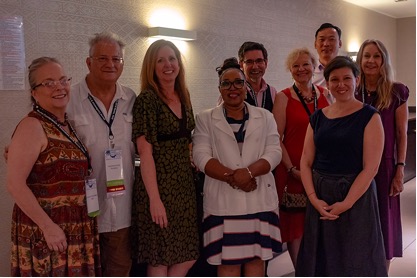Humanistic Education
Rome Conference Report of the Special Interest Group on Humanistic Education

Coordinator:
Joyce Pittman, PhD, Drexel University, Philadelphia, PA – USA
Email: joyce.pittman@gmail.com
Members:
1. Peter J. Caccavari- Secretary
2. Xie Yi- China
3. Eugine Manila Arouza Pai – India
4. Penelope Keough – USA
5. Evelyn Serrano – USA
6. Sheryl Davis – USA
7. Laura Mueller – USA
8. Charlotte Royeen-USA
9. Sandor V. Klein-Hungary
10. Laurel Miltenberger-USA
Chairperson: Genevieve Balance Kupang, Ph.D.
Preamble
A need exists to understand the foundational identity of global citizenship education programs.
Our concern for humanistic education for all learners in the world is based on knowledge that existing curriculum and instructional systems place much emphasis on content learning and teaching without consideration for the whole learner or learning conditions.
The Humanistic Education (HE) SIG encourages WCCI members, partners and collaborators to focus on the convergence of learner-centered pedagogy, interconnected communities of learning and holistic pedagogy to maximize educational and human potential. The aim is to encourage support for equitable access to compassionate, creative, ethical and global learning opportunities. Providing such interconnected pedagogy will empower learners to develop their full potential through both cognitive and affective domains thereby addressing needs of the whole learner.
We believe the possibility for self-learning is critical to ensure learners become engaged and caring global citizens with the ability to engage in diverse thinking and learning communities, which values differences and creativity through an interconnected learning culture premised on holistic humanistic learning principles.
We believe such interconnected communities of learners will provide opportunities to foster and nurture cooperation, compassion where learners and teachers understand and value the importance of relationship building that shows respect for all life.
Recommendations
Approaches/ Strategy/ Pedagogy
-
Holistic education by design
-
Nurturing community
-
Natural learning community
-
Learning culture
-
Elevating relationships
-
Interconnected and contextual
-
Learner-centered
-
Cognitive and affective domains
Principles
-
Respect for all life
-
Compassion
-
Whole learner
-
Self-motivated learning
-
Creative problem-solving
-
Values and ethics
-
Non-content specific C & I strategies
We recommend that WCCI adopt and support the following ideas to encourage a more humanistic approach to developing a more culturally relevant and personalized learner-centered pedagogy to support curriculum and instruction for global stewardship of the natural world.
Recommendation 1: The Humanistic Education (HE) SIG encourages WCCI members, partners, and collaborators to focus on the convergence of person-centered pedagogy, interconnected communities of learning, and holistic pedagogy to maximize educational and human potential.
Recommendation 2: Encourage support for equitable access to compassionate, creative, ethical, and global learning opportunities. Providing such interconnected pedagogy will empower learners to develop their full potential through cognitive and affective domains thereby addressing the needs of the whole learner.
Recommendation 3: Create advocacy to advance personalized self-learning as a critical component of curriculum and instruction to ensure learners become engaged and caring global citizens who can engage in diverse thinking and learning communities, that value differences and creativity through an interconnected learning culture premised on holistic humanistic learning principles.
Recommendation 4: Developing and supporting interconnected communities of learners will provide opportunities to foster and nurture cooperation, and compassion where learners and teachers understand and value the importance of relationship building that shows respect for all life.
Resolutions
-
The Humanistic Education SIG commits to encouraging WCCI members, partners and collaborators to focus on the convergence of learner-centered pedagogy, interconnected communities of learning and holistic pedagogy to maximize educational and human potential.
-
We urge all SIG members to share knowledge from investigations, personal and professional projects about how members and other educators are using humanistic education to transform teaching and learning communities to advance humanistic educational principles in curriculum development and instruction in the world for all people.
-
We further commit to encouraging support for equitable access to compassionate, creative, ethical and global learning opportunities for all learners.
-
Finally, the HE SIG commits to supporting and encouraging WCCI to adopt humanistic education as the foundational identity of global citizenship, social justice, and peace education programs.
We believe that providing active, engaged and culturally relevant interconnected pedagogy will empower learners to develop their full potential through both cognitive and affective domains thereby addressing needs of the whole learner.
Action Plan (2018-2020)
-
Confirm the HE SIG membership, Action Plan team leaders, and their contact information (2018).
-
Design and set up the Humanistic Education Website on the WCCI Website (2018).
-
Conduct a survey of WCCI members; compile the data and a report about the meaning of “humanistic education” in their practice (2018).
-
Plan and deliver a Webinar to promote the exchange of knowledge and best practice in the development and maintenance of suitable international education projects that support humanistic education principles, strategies and practices (2019).
-
Plan and hold a hybrid (FTF and virtual) session at the next USA Chapter meeting in 2019 to review progress and explore how the Humanistic Education SIG can add value to WCCI– bring new insights (perspectives) on sustainable collaborations through curriculum and instructional advancement projects (2019)
-
Prepare a comprehensive report for 2018-2019 activities and accomplishments to share at the WCCI 19th World 50th Anniversary Conference in San Diego (2020).
Contact Us
UNIVERSITY OF PÉCS
H-7622 Pécs
Vasvári Pál utca 4., Hungary
Mailing Address: 7602 Pécs
P.O. Box 219
Phone: +36 72/501-500
Fax: +36 72/501-508


